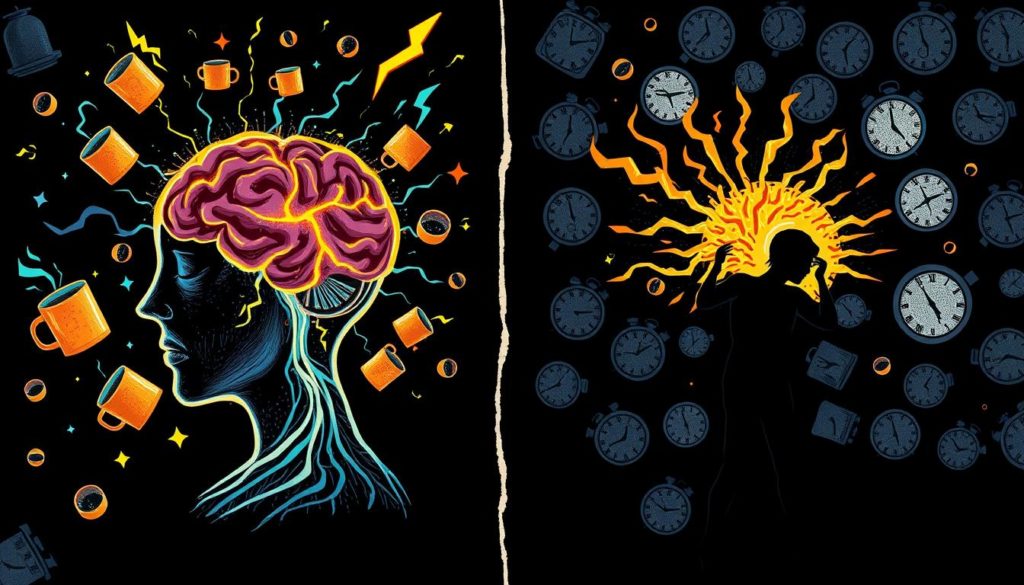Did you know almost 90% of people worldwide have caffeine daily? It might be through morning coffee or afternoon tea. Caffeine is a big part of our daily lives. But have you ever thought about how it affects us?
This article looks at caffeine and its impact on health. We will explore the good and the potential bad sides of caffeine use. Knowing this helps us make better decisions about our caffeine intake.
Are you interested in learning more about caffeine? Want to know the best ways to use it daily? Stay tuned. We will share important facts and useful tips to improve your caffeine habits.
Understanding Caffeine: What Is It?
Caffeine is a natural stimulant found in coffee, tea, and chocolate. It’s part of the methylxanthines class. It boosts alertness and fights fatigue. Caffeine goes into the bloodstream and towards the brain. There, it stops adenosine receptors, making more dopamine. This process makes you more alert.

Natural Sources of Caffeine
There are many natural sources of caffeine. Coffee beans, from the Coffea plant, are well-known for their caffeine. Tea leaves from the Camellia sinensis plant also have a lot of caffeine. Cacao pods, which are key in making chocolate, also have this energizing substance. These sources have been boosting energy and focus for centuries.
Common Caffeine Products
But caffeine isn’t just in natural sources. It’s also in many products. Energy drinks like Red Bull and Monster give a caffeine boost quickly. Soft drinks, like colas and some root beers, add caffeine too. It’s even in some medications, like pain relievers and diet pills, for its energy-boosting effects. Knowing all the sources helps control how much caffeine you get.
| Product | Caffeine Content (mg) |
|---|---|
| Drip Coffee (8 oz) | 95 |
| Espresso (1 oz) | 63 |
| Black Tea (8 oz) | 47 |
| Energy Drink (8 oz) | 80 |
| Dark Chocolate (1 oz) | 23 |
How Caffeine Affects the Brain and Body
Millions of people drink caffeine every day for an energy boost. It works by stopping adenosine receptors in the brain. Since adenosine makes you sleepy and relaxed, blocking it keeps you awake and alert.

When you drink caffeine, several things start to happen in your body. It quickens brain activity, helping you focus better. Yet, caffeine doesn’t only affect the brain; it also speeds up your heart and raises blood pressure a bit. Even though healthy people can handle these changes, they show caffeine’s strong effects.
“Caffeine’s interaction with adenosine receptors is essential for understanding its widespread effects on the brain and body.”
| Impact Area | Observed Effects |
|---|---|
| Brain | Enhanced alertness, reduced fatigue |
| Heart | Increased heart rate |
| Blood Pressure | Mild elevation |
Caffeine has many effects, making it powerful but helpful. Learning how it stimulates the brain by blocking adenosine receptors is important. This helps us make smart choices about drinking caffeine.
Benefits of Caffeine Consumption
Caffeine is praised for its many benefits. It improves both physical and mental performance. This section will show how caffeine boosts these areas.
Enhanced Physical Performance
Caffeine has a big impact on sports performance. Research shows it boosts endurance, strength, and energy levels.
- Energy Boost: Caffeine provides a quick energy lift. This helps athletes exercise longer and harder.
- Enhanced Endurance: Regular use of caffeine can make you last longer in physical activities without getting tired too soon.
- Increased Strength: Caffeine powers up the central nervous system. This increases muscle strength and power, which is great for weightlifters and sprinters.
Improved Cognitive Function
Caffeine also sharpens the mind. It increases focus and alertness. This makes complex tasks easier and improves concentration.
- Better Memory: Caffeine improves short-term memory. This makes it easier to learn and remember new information.
- Increased Attention: Thanks to caffeine, it’s easier to stay focused and not lose concentration.
- Enhanced Mood: Caffeine boosts the brain’s neurotransmitters. This lifts your mood and fights off stress and depression.
Here’s a quick summary of caffeine’s benefits:
| Aspect | Benefits |
|---|---|
| Athletic Performance | Energy boost, enhanced endurance, increased strength |
| Mental Acuity | Better memory, increased attention, enhanced mood |
Caffeine and Health: The Pros and Cons
Caffeine is a big part of many people’s diets. It has both good and bad sides. Knowing how to balance these can lead to a healthier caffeine consumption.
Health Benefits
One great thing about caffeine is its antioxidants. These antioxidants help fight harmful free radicals. Also, a moderate amount of caffeine can lower the risk of diseases like Parkinson’s and Alzheimer’s. Plus, it can boost mental sharpness and physical performance.
Potential Health Risks
However, caffeine also has some downsides. Too much of it can raise your heart rate and blood pressure. It might disturb your sleep and make you feel jittery or anxious. So, it’s important to limit how much caffeine you have. Keeping an eye on your consumption can help find the right balance. This way, you can enjoy caffeine without harming your health.
| Aspect | Health Benefits | Potential Risks |
|---|---|---|
| Content | High in antioxidants | Elevated cardiovascular risk |
| Mental Impact | Improves alertness | Can cause anxiety |
| Physical Effects | Enhances endurance | Disrupts sleep |
Caffeine Metabolism and Individual Differences
We need to understanding why caffeine affects people differently. The liver enzymes play a huge role in this. They break down caffeine in our bodies. But these enzymes work differently in everyone due to genetic factors. This means each person’s body deals with caffeine in its own way.
For example, two people might drink the same amount of coffee. Yet, they could feel completely different afterwards. This difference comes down to two main points.
- Genetic Factors: Your genes determine how your liver processes caffeine.
- Liver Enzymes: How well liver enzymes work can change caffeine’s effect on you.
Here is a table that shows how genetics and liver enzymes change caffeine metabolism:
| Factor | Impact on Metabolism |
|---|---|
| Genetic Makeup | Variations in genes like CYP1A2 make some metabolize caffeine faster or slower. |
| Liver Enzyme Efficiency | When liver enzymes are efficient, they break down caffeine fast, reducing how long it stays in your body. |
| Environmental Influences | Your diet, lifestyle, and health can change how enzymes work and your caffeine tolerance. |
These elements mainly decide how much caffeine you can handle. For some, coffee before sleep does nothing. But, others might get jittery from just a little. Knowing this can help you decide how much caffeine is right for you.
Risks of Excessive Caffeine Intake
Caffeine can make you more alert and enhance performance. But, it’s important to watch how much you drink. Drinking too much can cause problems, both now and later on.
Short-Term Side Effects
Too much caffeine can make you uncomfortable right away. You might feel jittery or more anxious than usual. Insomnia can also be a problem, messing with your sleep. On top of that, your heart may start to feel weird, beating oddly or too fast. The FDA says we need to keep an eye on how much caffeine we have to steer clear of these issues.
Long-Term Health Implications
Drinking too much caffeine for a long time is risky, too. If you do it a lot, you might end up with heart problems or even a caffeine overdose. That’s pretty scary. It’s best to stick to recommended amounts to stay healthy and avoid big problems down the road.
Caffeine Addiction and Dependence
To grasp caffeine addiction and dependence, we must see how often using this stimulant affects us. Mainly, caffeine addiction happens when someone needs caffeine to feel normal. They crave its effects and can’t function without it.
With regular use, our bodies need more caffeine to feel its energy boost. This need makes reducing caffeine tough without withdrawal symptoms.
- Initial Phase: Increased alertness and energy levels.
- Tolerance Development: Gradual need for more caffeine to feel the same effects.
- Dependence Phase: Feeling of reliance on caffeine to function normally.
- Potential Addiction: Compulsive consumption despite adverse effects.
Caffeine dependence can harm our body and mind. It leads to headaches, moodiness, and tiredness when not consumed. Knowing the signs of caffeine addiction helps manage it and keeps us healthy.
“Caffeine addiction can subtly integrate into one’s lifestyle, making it difficult to pinpoint the exact moment dependence begins,” says Dr. Laura Juliano, a caffeine researcher at American University.
Let’s look at the differences between using caffeine often, building tolerance, and becoming dependent:
| Term | Description | Impact |
|---|---|---|
| Habitual Consumption | Regular intake of caffeine | Can lead to mild dependence |
| Tolerance | Need for increased doses over time | Requires more caffeine for same effect |
| Dependence | Reliance on caffeine for normal function | Withdrawal symptoms if intake is reduced |
| Addiction | Compulsive need for caffeine | Significant impact on daily life |
It’s crucial to address caffeine addiction and dependence for a healthy life. By knowing the signs and how caffeine affects us, we can decide better about our caffeine use.
Recognizing Caffeine Withdrawal Symptoms
When you cut back or quit caffeine, your body may react with withdrawal symptoms. These symptoms can range in how strong they are and how long they last. Knowing what they are can help you deal with them better.
Common Symptoms
It’s important to know the signs of caffeine withdrawal. Some common symptoms are:
- Headache: A very common withdrawal symptom. Caffeine withdrawal headaches can start suddenly and hit hard.
- Fatigue: You might feel very tired and slow without your usual caffeine boost.
- Irritability: People often feel cranky and have mood swings when they stop taking caffeine suddenly.
- Difficulty Concentrating: Cutting down on caffeine can make it hard to focus and cause mental fog.
Managing Withdrawal
Dealing with caffeine withdrawal successfully means managing it well. Here are some tips:
- Gradual Reduction: Lower your caffeine intake slowly instead of all at once to avoid harsh withdrawal symptoms.
- Stay Hydrated: Drinking a lot of water helps get rid of caffeine and keeps you hydrated. This makes headaches and tiredness less severe.
- Sleep Well: Getting enough sleep helps with fatigue and supports your overall health.
- Balanced Diet: Eating healthy foods gives you the energy you need when you’re cutting down on caffeine.
- Physical Activity: Working out regularly can boost your energy and improve your mood, making withdrawal easier.
Tips for Smart Caffeine Consumption
To consume caffeine wisely, learn to balance your intake for the best effects. Keeping potential risks low is key. Follow these tips for a healthy way to enjoy coffee, tea, or other caffeinated drinks.
- Monitor Your Intake: Keep an eye on your daily caffeine levels. Up to 400 mg a day, or about four 8-ounce cups of coffee, is safe for most.
- Choose Quality Over Quantity: Instead of drinking a lot, go for good quality caffeine. Choose fresh coffee, organic tea, and other natural caffeine sources.
- Time Your Consumption: Be smart about when you have caffeine. Avoid it late in the day so your sleep isn’t messed up.
- Stay Hydrated: Caffeine can make you lose water. Drink lots of water all day to keep hydrated.
- Combine with Healthy Habits: Have your caffeine with healthy activities. For instance, coffee before exercising can boost your physical performance.
- Listen to Your Body: Everyone reacts differently to caffeine. Pay attention to how it affects you and adjust how much you drink to avoid feeling jittery or losing sleep.
- Limit Sugary Additives: Many caffeinated drinks have lots of sugar. Cut down on these to avoid extra calories and stay healthy.
Using these strategies for smart caffeine use can enhance the benefits while keeping within safe intake limits. These healthy practices let you enjoy caffeine in a balanced way.
Popular Caffeine Myths and Facts
Many myths about caffeine are out there, causing confusion. It’s not just coffee that has caffeine; tea, chocolate, and some medicines do too. This knowledge helps people make better choices about their caffeine intake.
Some people think caffeine dehydrates you. But actually, when you drink caffeinated drinks in moderation, they don’t cause dehydration. This misunderstanding might stop some from enjoying their favorite drinks. Know that these drinks help meet your daily water needs.
There’s also a myth that caffeine stops kids from growing. But recent studies show that caffeine doesn’t affect a child’s growth. It’s crucial to clear up these old myths. This way, we avoid unnecessary worries about caffeine.
Understanding the truth about caffeine helps us make smarter choices about drinking it. Being well-informed is important. So, go ahead and savor your coffee, tea, and chocolate, knowing the facts about caffeine and its effects.
FAQ
What are the main effects of caffeine on the body?
Caffeine makes you more alert by blocking certain receptors in your brain. This reduces tiredness. It can also speed up your heart rate and raise your blood pressure.
What are the benefits of caffeine consumption?
Caffeine boosts physical performance, making you stronger and more enduring. It also helps with mental tasks like remembering, focusing, and staying in a good mood.
What are the natural sources of caffeine?
You can find caffeine in coffee beans, tea leaves, and cacao pods. These also come with healthy extras like antioxidants.
How is caffeine metabolized in the body?
The liver breaks down caffeine, using enzymes. How fast or slow this happens depends on your genes, which affects how caffeine impacts you.
What are the potential health risks associated with caffeine?
Drinking too much caffeine can cause trouble sleeping, anxiety, a shaky feeling, and a fast heartbeat. Over time, it might lead to heart issues.
What are common symptoms of caffeine withdrawal?
If you stop having caffeine, you might get headaches, feel very tired, get cranky, and find it hard to focus. These can start within a day after you cut back.
How can one manage caffeine withdrawal effectively?
To handle withdrawal, cut down on caffeine slowly instead of all at once. Drinking plenty of water and resting well also helps.
What are the signs of caffeine addiction and dependence?
If you need more caffeine to feel its effects or get headaches and feel grumpy when you don’t have it, you might be dependent on it.
Are there any tips for smart caffeine consumption?
To drink caffeine wisely, keep your intake low, don’t have it late in the day, and choose natural drinks like tea and coffee instead of energy drinks with lots of sugar.
What are some popular myths about caffeine?
A myth about caffeine is that it dries you out, but if you don’t overdo it, coffee and tea actually add to your daily fluids. Another myth is that everyone gets addicted to caffeine, but not everyone’s body reacts the same way to it.


